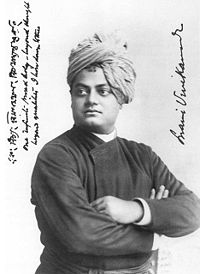51. तिैयाग्मादणऩ दोषफीज म ेकैवल्यभ ॥५१॥्
tad-vairāgyād-api doṣa-bīja-kṣaye kaivalyam ||51||
By giving up even these comes the destruction of the very seed of evil; he attains Kaivalya.
He attains aloneness, independence. Then that man is free. When he gives up even the ideas of omnipotence and omniscience, there will be entire rejection of enjoyment, of the temptations from celestial beings. When the Yogi has seen all these wonderful powers, and rejected them, he reaches the goal. What are all these powers? Simply manifestations. They areno better than dreams. Even omnipotence is a dream. It depends on the mind. So long as there is a mind it can be understood, but the goal is beyond even the mind.
52. स्थान्यऩणनभन्त्रिु े सङ्गस्ममाकयिंऩन्ु अणनष्टप्रसङ्गात ॥५२्॥
sthāny-upa-nimantraṇe saṅga-smaya-akaraṇaṁ punar-aniṣṭa-prasaṅgāt ||52||
The Yogi should not feel allured or flattered by the overtures of celestial beings, for fear of evil again.
There are other dangers too; gods and other beings come to tempt the Yogi. They do not want anyone to be perfectly free. They are jealous, just as we are, and worse than we sometimes. They are very much afraid of losing their places. Those Yogis who do not reach perfection die and become gods; leaving the direct road they go into one of the side streets, and get these powers. Then again they have to be born; but he who is strong enough to withstand these temptations, and go straight to the goal, becomes free.
53. ितत्क्रभमो् संमभादणववकजंे ानभ ॥५३॥्
kṣaṇa-tat-kramayoḥ saṁyamāt vivekajaṁ-jñānam ||52||
By making Samyama on a particle of time and its multiples comes discrimination.
How are we to avoid all these things, these Devas, and heavens, and powers? By discrimination, by knowing good from evil. Therefore a Samyama is given by which the power of discrimination can be strengthened. This is by making Samyama on a particle of time.
54. जाणतर िदशेयन्यताऽनवच्छैेदात त्ल्यमोस्तत्ु प्रणतऩणत्त्॥५४॥
jāti-lakṣaṇa-deśaiḥ anyatā-anavacchedāt tulyayoḥ tataḥ pratipattiḥ ||54||
Those which cannot be differentiated by species, sign and place, even they will be discriminated by the above Samyama.
The misery that we suffer comes from ignorance, from non-discrimination between the real and the unreal. We all take the bad for the good, the dream for the reality. Soul is the only reality, and we have forgotten it. Body is an unreal dream, and we think we are all bodies. This non-discrimination is the cause of misery, and it is caused by ignorance. When discrimination comes it brings strength, and then alone can we avoid all these various ideas of body, heavens, and gods and Devas. This ignorance arises through differentiating by species, sign or place. For instance, take a cow. The cow is differentiated from the dog, as species. Even with the cows alone how do we make the distinction between one cow and another? By signs. If two objects are exactly similar they can be distinguished if they are in different places. When objects are so mixed up that even these differentiæ will not help us, the power of discrimination acquired by the above-mentioned practice will give us the ability to distinguish them. The highest philosophy of the Yogi is based upon this fact, that the
Purusa is pure and perfect, and is the only “simple” that exists in this universe. The body and mind are compounds, and yet we are ever identifying ourselves with them. That is the great mistake that the distinction has been lost. When this power of discrimination has been attained, man sees that everything in this world, mental and physical, is a compound, and, as such, cannot be the Purusa.
55. तायकंसवणवषमंयसवथाणवषमभय अिभं्चणते णववकजंे ानभ॥५५॥्
tārakaṁ sarva-viṣayaṁ sarvathā-viṣayam-akramaṁ-ceti vivekajaṁ jñānam ||55||
The saving knowledge is that knowledge of discrimination which covers all objects, all means.
Saving, because the knowledge takes the Yogi across the ocean of birth and death. The whole of Prakriti in all its states, subtle and gross, is within the grasp of this knowledge. There is no succession in perfection by this knowledge: it takes in all things simultaneously, at a glance.
56. सत्त्वऩुषमो् शणद्धसाम्यु ् ेकैवल्यभ इणत ॥५६॥
sattva-puruṣayoḥ śuddhisāmye kaivalyam ||56||
By the similarity of purity between the Sattva and the Purusa comes Kaivalya.
When the soul realises that it depends on nothing in the universe, from gods to the lowest atom, that it is called Kaivalya (isolation) and perfection. It is attained when this mixture of purity and impurity called mind has been made as pure as the Purusa Itself; then the Sattva, the mind, reflects only the unqualified essence of purity, which is the Purusa.
 Swami Vivekananda
Swami Vivekananda
